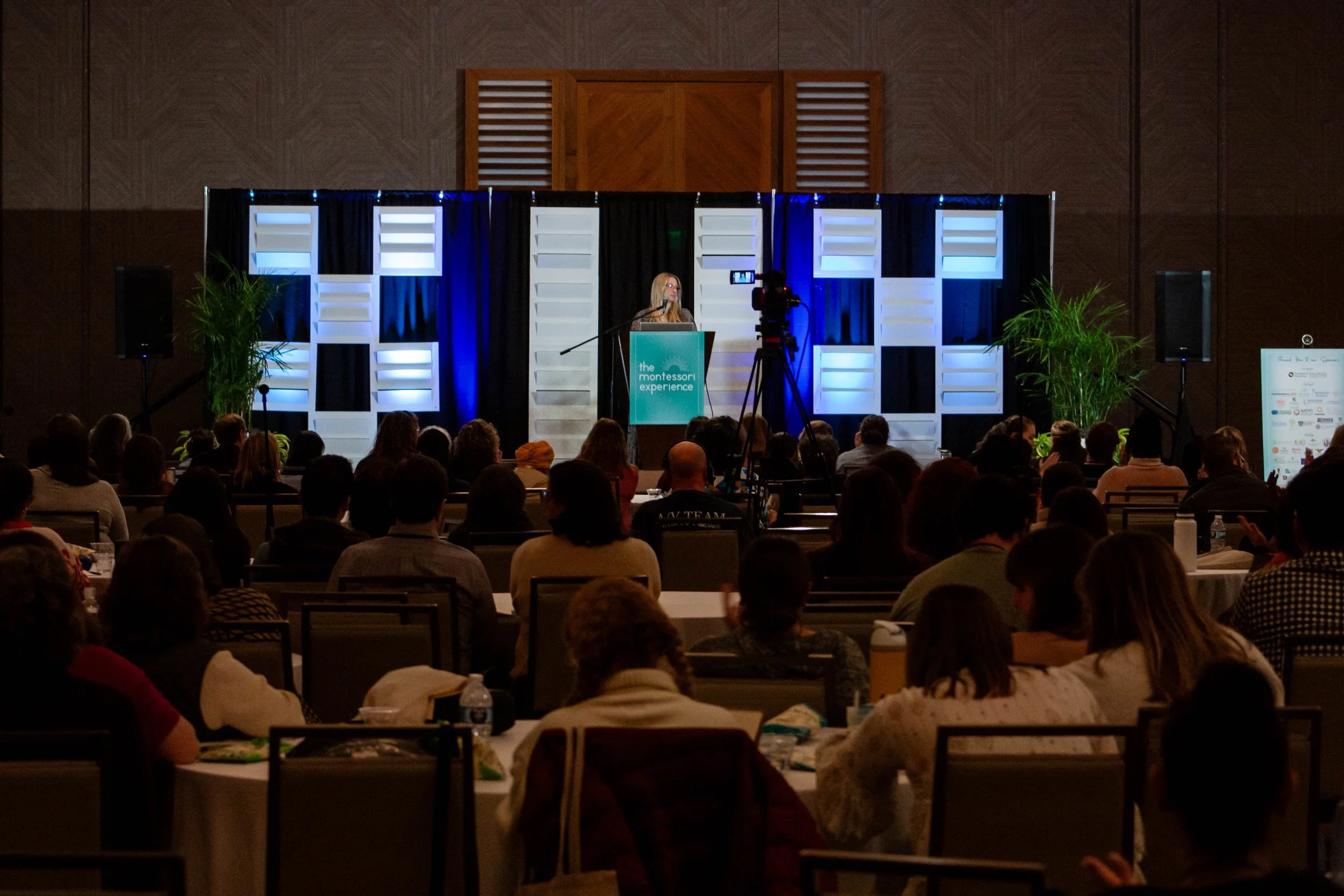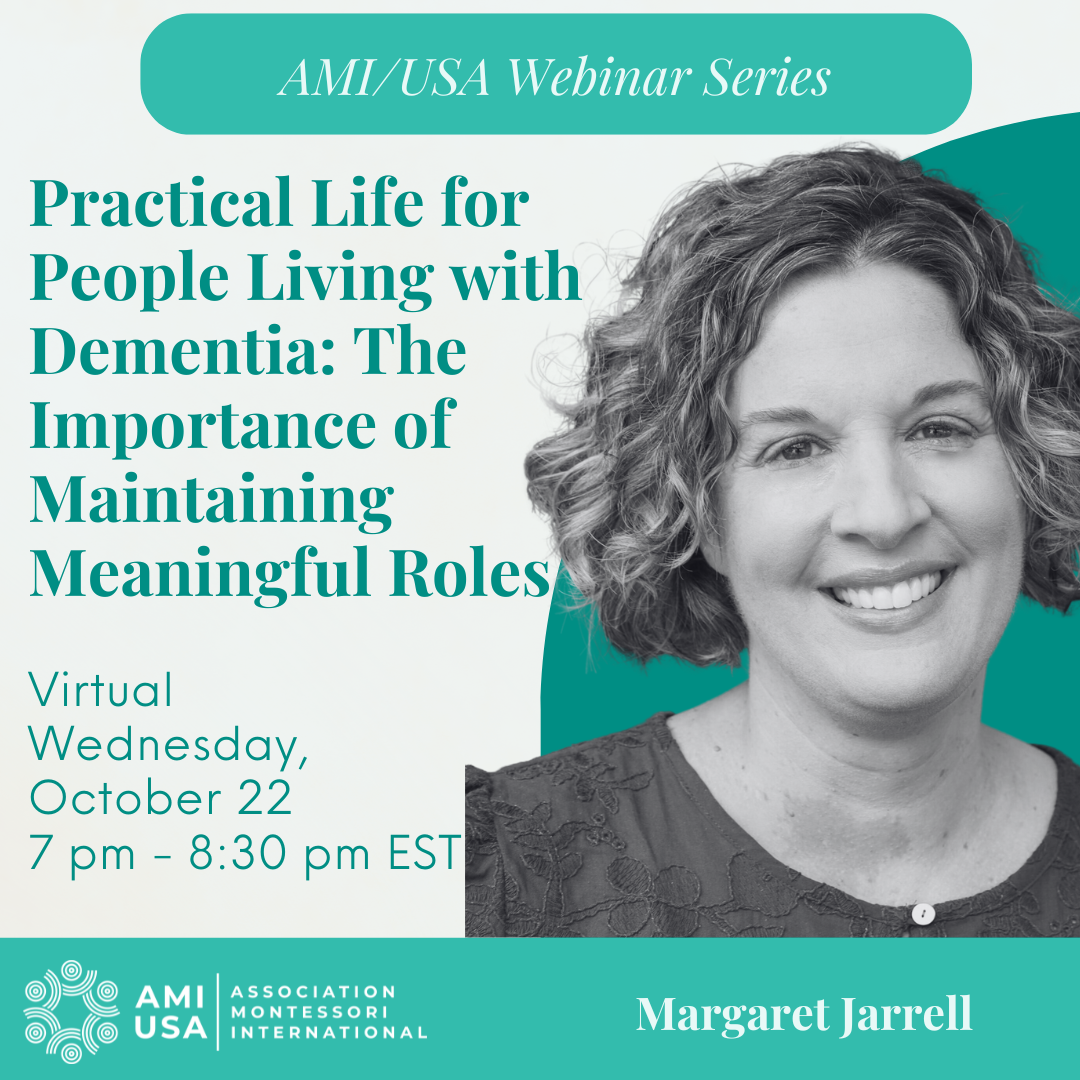
Upcoming AMI/USA Events

Supporting the Struggling Reader: Dyslexia in the Prepared Environment Part 4
In this 4-part series, Gina Polly Applegate (C-SLDS, FIT/OGA) will guide teachers, administrators, and specialists through an overview of dyslexia, including how to screen for it, identify students who may be at risk, and support them in the classroom. The series will take a closer look at key areas of literacy, including phonological awareness, phonics, morphology, oral reading fluency, spelling, writing, and editing. You will leave with strategies that are essential for students with dyslexia and beneficial for all learners.
Session 4: Morphology and Oral Reading Fluency
With a strong phonics foundation, children can begin to decode longer words. However, multisyllabic words can be more challenging, as it becomes harder to hold all the sounds in memory while making meaning. This session explores the progression toward reading multisyllabic words and how recognizing common prefixes, roots, and suffixes can support vocabulary growth and reading comprehension. It will also address oral reading fluency, including ways to help students build accuracy and expression through repeated reading.
Gina Polly Applegate is a 6-12 AMI-trained guide with over 20 years of experience working in AMI schools as both a lower el guide and upper el guide as well as an administrator. She is a Certified Structured Literacy Dyslexia Specialist (C-SLDS) through the Center for Effective Reading, an affiliate of the International Dyslexia Association as well as a Fellow-in-Training with The Orton-Gillingham Academy (FIT/OGA). She currently works at Austin Montessori School as the Director of Inclusion and Support and is an elementary consultant for AMI/USA. She became passionate about supporting children with dyslexia in Montessori after her youngest son was diagnosed with dyslexia.


Supporting the Struggling Reader: Dyslexia in the Prepared Environment Part 3
In this 4-part series, Gina Polly Applegate (C-SLDS, FIT/OGA) will guide teachers, administrators, and specialists through an overview of dyslexia, including how to screen for it, identify students who may be at risk, and support them in the classroom. The series will take a closer look at key areas of literacy, including phonological awareness, phonics, morphology, oral reading fluency, spelling, writing, and editing. You will leave with strategies that are essential for students with dyslexia and beneficial for all learners.
Session 3: Spelling, Writing, Editing
To sound out a word in order to spell it accurately, a child needs to have had practice with phonological awareness and phonics. Additionally, the need to work with PuzzleWords does not end in Children’s House. Elementary children also need much practice with high frequency, non-phonetic words both for reading and spelling. In this session, we will explore ways to support organic and independent spelling practice, guide dyslexic children in sentence expansion and later paragraph expansion, incorporate dictation across the different areas of the classroom, and help students learn to edit their own written work.
Gina Polly Applegate is a 6-12 AMI-trained guide with over 20 years of experience working in AMI schools as both a lower el guide and upper el guide as well as an administrator. She is a Certified Structured Literacy Dyslexia Specialist (C-SLDS) through the Center for Effective Reading, an affiliate of the International Dyslexia Association as well as a Fellow-in-Training with The Orton-Gillingham Academy (FIT/OGA). She currently works at Austin Montessori School as the Director of Inclusion and Support and is an elementary consultant for AMI/USA. She became passionate about supporting children with dyslexia in Montessori after her youngest son was diagnosed with dyslexia.

Supporting the Struggling Reader: Dyslexia in the Prepared Environment Part 2
In this 4-part series, Gina Polly Applegate (C-SLDS, FIT/OGA) will guide teachers, administrators, and specialists through an overview of dyslexia, including how to screen for it, identify students who may be at risk, and support them in the classroom. The series will take a closer look at key areas of literacy, including phonological awareness, phonics, morphology, oral reading fluency, spelling, writing, and editing. You will leave with strategies that are essential for students with dyslexia and beneficial for all learners.
Session 2: Phonological Awareness and Phonics:
Children with dyslexia often have particular difficulty separating the individual sounds in words. They need consistent and intentional practice with phonological awareness, which is the ability to recognize and manipulate the sounds in spoken language. Phonics, the skill of connecting those sounds to letters, builds on this foundation. This session will focus on both phonological awareness and phonics, which are essential components of reading development. We will look at how to support extended practice of these skills using the materials and lessons from your albums.
Gina Polly Applegate is a 6-12 AMI-trained guide with over 20 years of experience working in AMI schools as both a lower el guide and upper el guide as well as an administrator. She is a Certified Structured Literacy Dyslexia Specialist (C-SLDS) through the Center for Effective Reading, an affiliate of the International Dyslexia Association as well as a Fellow-in-Training with The Orton-Gillingham Academy (FIT/OGA). She currently works at Austin Montessori School as the Director of Inclusion and Support and is an elementary consultant for AMI/USA. She became passionate about supporting children with dyslexia in Montessori after her youngest son was diagnosed with dyslexia.

Practical Life for People Living with Dementia: The Importance of Maintaining Meaningful Roles
The Montessori approach to Aging and Dementia combines Dr. Montessori’s philosophy with person-centered care and dementia care best practices. The Montessori philosophy of care is now being implemented in long-term care communities and individual homes throughout the world.
In this webinar, we will focus on a key component of the Montessori approach for people living with dementia: Practical Life. All too often, older adults living with dementia lose access to many of the roles and responsibilities they previously enjoyed, which impacts their sense of purpose and self-worth. It becomes essential then that care partners get to know each person deeply, so that we can discover what roles each person would enjoy and find ways for them to step back into those roles. In Montessori communities and homes, you will see people living with dementia setting the table, watering plants, sweeping the floor, preparing food, folding laundry, filling the birdfeeder, and so much more. We will discuss ways to prepare the environment and design materials that enable independence with these roles, and how to establish them as routines for people living with dementia. (Yes, people living with dementia can learn new routines with consistent practice!) There will be lots of examples given and an opportunity to brainstorm and collaborate as a group. If you know someone living with dementia and would like to learn more, please join us!
Participants will…
Receive a brief introduction to the Montessori philosophy of care for people living with dementia
Understand the importance of meaningful roles in maintaining a sense of purpose and self-worth
Brainstorm and create a list of potential roles for people living with dementia
Learn to design dementia-friendly roles, including planning, making materials, and preparing the environment
Learn to build routines around these roles, including introducing a new role, consistent practice, and training other care partners
Be introduced to ways to learn more about the Montessori for Aging and Dementia movement
Margaret Jarrell
Margaret began her Montessori journey at age three at a small Montessori school in Washington, D.C. She fell in love with the Montessori Method and went on to pursue a Masters Degree in Education and her Elementary Montessori certification. Margaret was a Lower Elementary Guide for 12 years. She is now the Director of the Greenspring Center for Lifelong Learning, a non-profit organization that supports Montessori teachers, leaders, and schools.
Margaret is also an AMI Trainer in Montessori for Dementia & Aging and co-author of Montessori for Elder and Dementia Care (Second Edition) with Jennifer Brush. For Brush Development, Margaret develops curriculum, teaches workshops, and provides coaching for both Montessori educators and healthcare professionals adopting the Montessori philosophy of care.
Margaret lives in St. Petersburg, Florida with her family and daughter, a Montessori Elementary student.

Reimagining High School: Montessori’s Third Space Approach to Supporting Every Learner (Students and Adults)
This webinar explores how Montessori high schools function as transformative “third spaces” - environments that bridge home and traditional school to create unique developmental communities where adolescents can authentically grow into themselves. Through the voices of current students, alumni, parents, and practitioners, participants will discover how Montessori’s prepared environment approach extends beyond elementary years to support neurodivergent learners, foster genuine parent-educator partnerships, and create inclusive communities where every adolescent’s individual developmental needs are honored. The panel will examine how these schools reimagine the traditional high school experience by emphasizing student agency, collaborative learning, and meaningful work that connects to real-world purpose, ultimately demonstrating how Montessori’s third space approach nurtures not just academic achievement but the whole person - supporting both students and the adults who learn alongside them in this shared journey of growth and discovery.
Regina Dyson
Board Chair, Montessori for Social Justice | Community Outreach Coordinator, Oneness-Family High School
Regina Dyson is a lifelong Montessorian, educator, and advocate with over 33 years of experience in community engagement, education, and nonprofit leadership. She serves as Board Chair of Montessori for Social Justice and is the Community Outreach Coordinator at Oneness-Family High School, where her youngest child graduated.
Since beginning her Montessori journey in 1992 at an Afro-centered school in Atlanta, Regina has held diverse roles including executive director, classroom assistant, afterschool coordinator, and organizational consultant. Her work focuses on justice, equity, diversity, inclusion, and belonging (JEDIB), with a strong commitment to intergenerational coalition building, adolescent leadership, restorative justice, and parents as partners.
Regina also brings deep expertise as a project manager, developmental coach, and organizational transition specialist, and remains a fierce advocate for Montessori for all—across generations and communities.
Andrew Faulstich
After working in schools around the world, Andrew is convinced that the education status quo must be disrupted. He is the Co-Founder of Developing Education, which operates three sub-divisions: Breaking the Paradigm, First Intention, and The Enlightened Educator Project. Additionally, Andrew is the Montessori Curriculum and Pedagogy Coordinator and Humanities Guide at the Oneness-Family Montessori High School and an Affiliate Instructor of Montessori Teacher Education at the graduate level at Loyola University. He holds a Masters in International Educational Development from the University of Pennsylvania Graduate School of Education, a Bachelors in Anthropology from the University of Rochester, an AMI Montessori Adolescent Diploma, a Teaching for Equity Micro-Certification from Embracing Equity, and a certificate from the Phillips Exeter Humanities Institute.

Member School Webinar - An information session with Adennill
Discover support for member schools with the knowledge, expertise and assistance needed to be better prepared to create safe and secure environments. Learn more about the free School Safety Self-Assessment and other benefits from Adennill to help you reflect on and strengthen the preparedness of your school community.

Dyslexia Series Part 1
Supporting the Struggling Reader: Dyslexia in the Prepared Environment
In this 4-part series, Gina Polly Applegate (C-SLDS, FIT/OGA) will guide teachers, administrators, and specialists through an overview of dyslexia, including how to screen for it, identify students who may be at risk, and support them in the classroom. The series will take a closer look at key areas of literacy, including phonological awareness, phonics, morphology, oral reading fluency, spelling, writing, and editing. You will leave with strategies that are essential for students with dyslexia and beneficial for all learners.
Session 1: The Earlier, the Better: Recognizing Risk and Screening for Dyslexia
As many as 1 in 5 children have dyslexia or a specific learning disability in basic reading. This session provides an overview of dyslexia, including its definition, and covers other specific learning disabilities that affect reading development. It will also cover early signs teachers can look for and introduce common screening tools and practices that support early identification. It will also introduce the Orton-Gillingham approach as a well-respected treatment for dyslexia and offer guidance on how to help parents find intensive support if needed.
Gina Polly Applegate is a 6-12 AMI-trained guide with over 20 years of experience working in AMI schools as both a lower el guide and upper el guide as well as an administrator. She is a Certified Structured Literacy Dyslexia Specialist (C-SLDS) through the Center for Effective Reading, an affiliate of the International Dyslexia Association as well as a Fellow-in-Training with The Orton-Gillingham Academy (FIT/OGA). She currently works at Austin Montessori School as the Director of Inclusion and Support and is an elementary consultant for AMI/USA. She became passionate about supporting children with dyslexia in Montessori after her youngest son was diagnosed with dyslexia.

Member School Webinar - An information session with Kathy Minardi & Carson Smith on Dignity
Kathy Minardi and Carson Smith share more about Whole School Leadership’s mission as well as a 25% discount off the first module of their Transformational Leadership course and a 10% discount off the AMI Administrators Certificate Course for our member schools.

A Return to Self: A New School Year and New Commitment
A Return to Self: A New Year and New Commitment
This session will address the importance of personal self-care for guides, staff at all levels, and administrators during the 2025-26 school year, and beyond. Being of service and offering intelligent love doesn’t mean that we have to neglect our own physical, emotional, and mental well-being throughout the year. With Montessori philosophy as her guide, Maati challenges the notion that self-sacrifice is a sign of sound professional practice. She will offer an opportunity for all participants to return to self, explore somatic techniques, and act upon past and renewed commitments that center personal health and wellness. The ultimate goal is that participants will be better prepared to implement the Montessori pedagogy that honors and protects humans of all ages.
About Maati Wafford
Maati Wafford is a spirit-led educator that holds credentials in Montessori Primary, Elementary, and Administrative practices. She is a licensed social worker, equity practitioner, and the former Director of Equity and Engagement for the American Montessori Society(AMS). Currently she serves the Montessori community as an innovative educational entrepreneur, founder, and principal consultant of Radiant Mind Solutions.Her work focuses on integrating models of community care to strengthen schools, elevate teaching and learning, and support the overall well-being and transformation of the adult.Her unique eye integrates social work competencies around mental health and community models of care with inclusive pedagogy and best practice in adult learning and living.

Member School Webinar - An information session with Montessori Sports
Explore the Montessori Sports School Mentoring Program and other benefits designed to help schools integrate sports into the curriculum and culture. After the webinar, member schools can enjoy a free 30-minute consultation to address their personalized school needs.









